-
Car Reviews
- All reviews
- Midsize SUVs
- Small cars
- Utes
- Small SUVs
- Large SUVs
- Large cars
- Sports SUVs
- Sports cars
- Vans
Latest reviews
- Car News
-
Car Comparisons
Latest comparisons
- Chasing Deals
Mini has subtly tweaked its biggest car for 2021 with a new look and some changes inside the cabin, but is the $71,013 Countryman JCW SUV really worth considering?
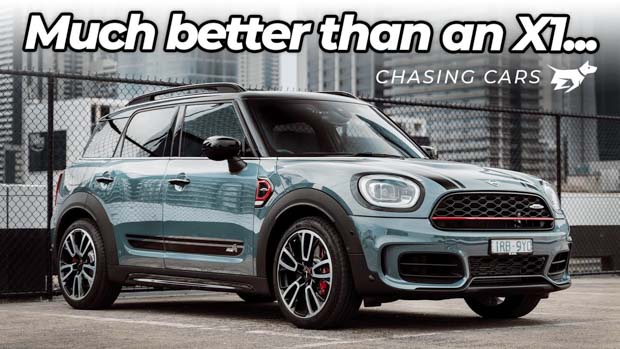
Following a 50kW power bump for the brand’s biggest car in 2019, Mini has now facelifted the Countryman JCW for 2021. The changes are mild, reflecting the fact the second-generation Countryman, which launched in 2016, is still looking fresh-faced.
The Countryman is a big car to be wearing a Mini badge, measuring 4,297mm long and 1,822mm wide, but even the largest Mini still sits at the shorter end of the premium small SUV segment in Australia, competing with the likes of the Audi Q3, BMW X2 and Mercedes-Benz GLA Class, all of which measure at least 6cm longer. That means the Countryman is usefully-proportioned for city dwellers.
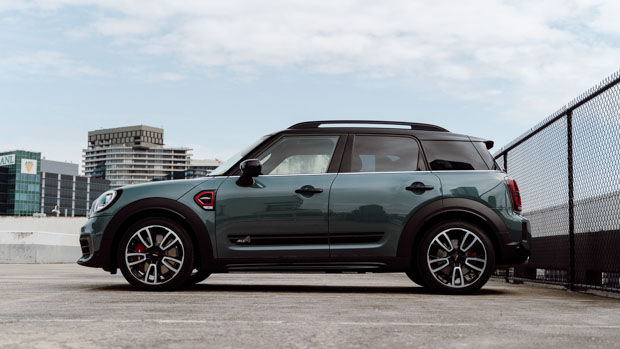
It’s also relatively expensive in John Cooper Works (JCW) Signature guise, which sits at the very top of the Mini range here in Australia, priced at $71,013 plus on-road costs. That’s certainly not cheap, but few of rivals offer Mini levels of customisation and fun-factor.
Mini has expanded the Countryman range for 2021 while dropping the diesel engines offered since launch. The most potent JCW version is available in Pure trim for $61,915 plus on-roads, or mid-spec Classic for $67,818 (plus on-roads).
On the outside, our JCW Signature turned heads with its attractive Sage Green paintwork with the must-have bonnet strips set off by the new matrix LED headlights – a signature exclusive – and red JCW detailing.
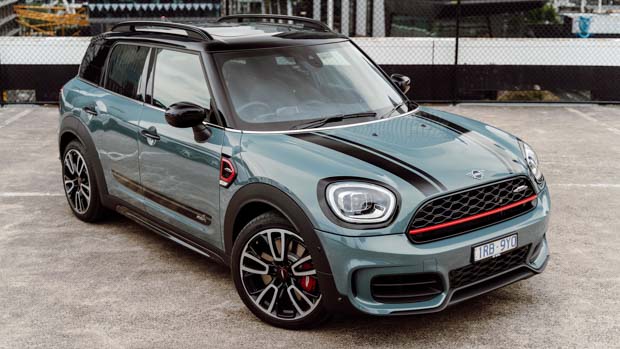
There is a new front grille and lower valance for 2021 and refreshed rear bumper with plenty of gloss black details that lend the Countryman JCW a bit of menace. Mini’s schtick is the ability to customise your car to no end – ergo there are nine exterior paint colours, four roof/mirror cap choices and a host of decal options offered on the Countryman.
Customisation might be a Mini selling point, but the ability to specify a different colour roof is not, in itself, enough to shift a car from the showroom floor. Luckily, the rest of the Countryman package is both quite accomplished and charming – especially with the punchy four-cylinder petrol engine under the bonnet.
In JCW guise, a BMW-sourced two-litre turbocharged ‘B48’ four-pot kicks out 225kW of power and 450Nm of torque, handy outputs even for this car’s hefty 1,605kg kerb weight. Mini claims a 0-100km/h sprint of 5.1 seconds, which feels about right in the real world.
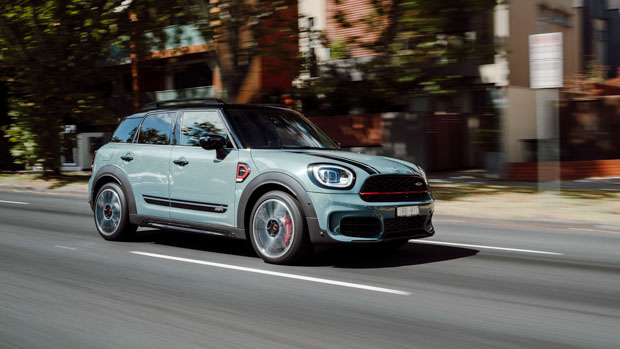
On startup, the JCW sounds fruity as the revs flare and the exhaust crackles – this thing is cheeky. Up on the move, the engine sounds full and beefy in the midrange, which is where it does its best work. There is little point chasing the redline, between 2,500-5,500rpm though there’s an addictive urgency to the power delivery.
Power is sent to all four wheels through an eight-speed Aisin torque converter transmission that does an admirable job up at speed with crisp enough shifts for a small SUV. It does a decent job of staying out of the driver’s way on a twisty road and in town while obeying the paddle shifters without protest.
Mini offers the Countryman with other engines, including a surprisingly sweet 110kW/220Nm turbo three-cylinder in the Cooper, a plug-in hybrid, and a detuned two-litre turbo Cooper S with outputs of 140kW/280Nm. The flagship Countryman JCW is the only variant to be fitted with all-wheel-drive; all other models are front-drive only.
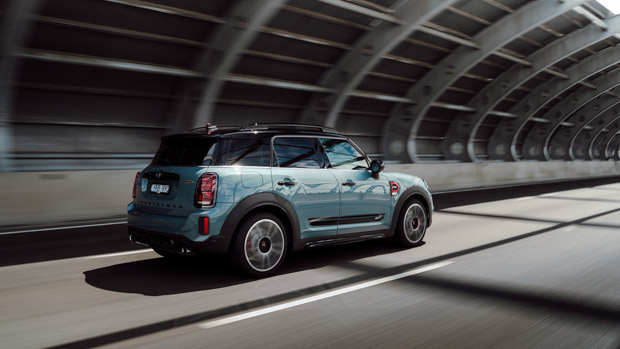
Aside from extra power and the traction of AWD, the Countryman benefits from a sportier suspension tune with adaptive dampers as standard. When left in ‘mid’ mode – the JCW avoids stodgy terms like ‘comfort’ – the Countryman’s damping is excellent.
When travelling at speed on a rough country road it remains totally poised and secure, but stick the toggle in sport mode and things get a little firmer without becoming bone-jarring, at least at high speed.
Unfortunately, the Countryman’s urban ride is less rosy thanks to a combination of 19-inch alloy wheels shod in Goodyear Eagle run-flat tyres. This sees the Countryman transmit sharp-edged bumps and speed humps into the cabin.

The Goodyear run-flats are rather loud on coarse-chip surfaces to a point where conversation occurs at an elevated volume. You don’t need to opt for massive alloys, though. Pro tip: the JCW Pure saves you $10,000, and is still fitted with adaptive dampers and smaller 18-inch alloys for a perfect-for-Australia ride quality.
Back to driving in the countryside, where the Countryman JCW is eager to show its talents on undulating, twisting ribbons of tarmac. As much as I preferred the lighter steering feel of mid mode, the extra body control from the adaptive dampers in sport mode was appreciated in fast direction changes.
While the all-wheel-drive system is front biased, it does shuffle power around and with the JCW pointed into a turn, you can float the SUV through in a neutral stance, and if you’re committed with a little over-rotation of the rear.
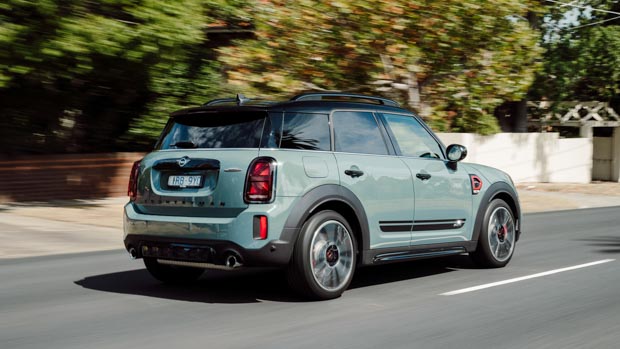
The Goodyear rubber doesn’t help that front end push. The rubber is by no means terrible, but they do squeal rather early if you drive the Countryman on the nose like you would a hot hatch.
Better to take a more measured approach in the twisties, medium pace on turn-in before leaning on the all-wheel-drive system to fire you out of the corners. It’s far more satisfying to drive than the BMW X1 which sits on the same platform, but never feels as keyed-in as the Mini hatch.
That said, if you’re looking for a fast Mini to carry your family, the Clubman JCW wagon is still our pick with its noticeably lower centre of gravity and even greater composure.
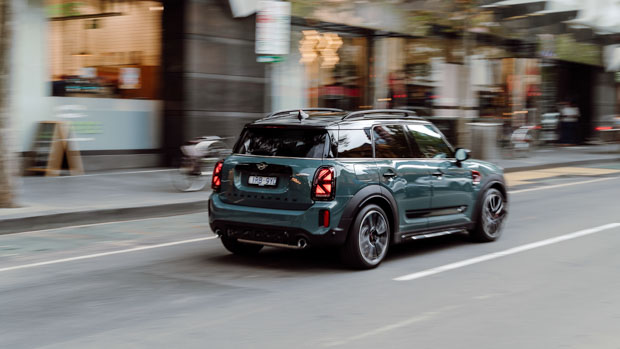
Where the Countryman’s UKL2 platform shows its age is in the safety department; the Mini lacks against the more affordable Mazda CX-30. Features like blind-spot monitoring, rear cross-traffic alert, lane-keep assist and reverse AEB are missing on even the dearest Countryman JCW.
A well-tuned adaptive cruise system, AEB with pedestrian and cyclist detection, front and rear parking sensors, reverse camera and six airbags were enough to see the Countryman get five stars from ANCAP in 2017.
Just like outside, Mini offers plenty of customisation in the cabin of the Countryman. Our car was conservatively finished in black leather with black inlays, but more adventurous buyers can choose Indigo or Malt Brown upholstery.
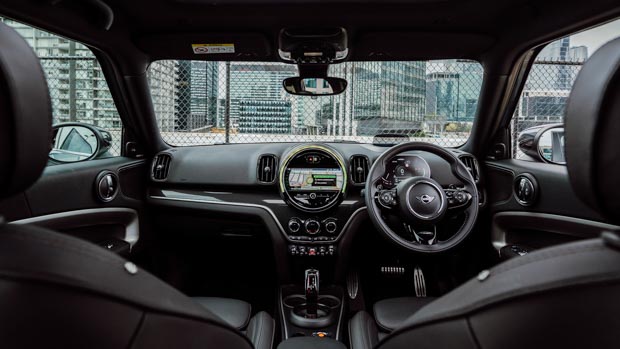
The seats themselves are electrically adjustable with memory function and heating. Not to mention supremely comfortable, well-bolstered and typically Germanic in their supportive firmness. The driving position is perfect for taller folk, too.
There is some pizazz to the cabin despite the dark materials, Mini circular motifs crop up with the 8.8-inch touchscreen encased in a round bezel now with haptic touch shortcut buttons beneath. There is also navigation, DAB radio, Harman Kardon stereo and faultless wireless Apple CarPlay and Android Auto as standard.
For 2021, Mini has added a 5.5-inch digital gauge cluster from the Mini SE. In the Countryman this sits oddly off to the left and fails to add anything useful over analogue gauges. I found myself relying mostly on the standard head-up display for speed and driving info.
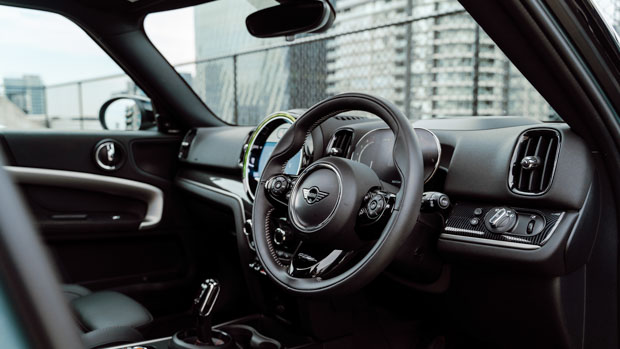
Where the Mini impresses is in the quality of materials and construction. There is a sturdiness to the cabin that feels more Germanic than the Union Jacks emblazoned headrests suggest.
A comfy adjustable armrest hides the clever Mini/BMW wireless charging pad and some covered storage, with two cupholders ahead of that, a USB-C, regular USB port and 12-volt socket, and really great door bins make the Countryman a rather practical place to spend time.

The back seat is not a place to complain about either; the Countryman’s unique square appearance pays off in the second row. Even at six-foot-two I had another inch of headroom even with the JCW’s twin sunroofs, not to mention good knee-room and oodles of toe room.
Content is hit and miss in the back seat, with no true fold-down armrest – just a ski-port to flip down – though the high-quality leather continues on the seats. There are soft-touch plastics and Alcantara appointments on the doors, adjustable air vents and a pair of fast-charging USB-C ports for passengers.
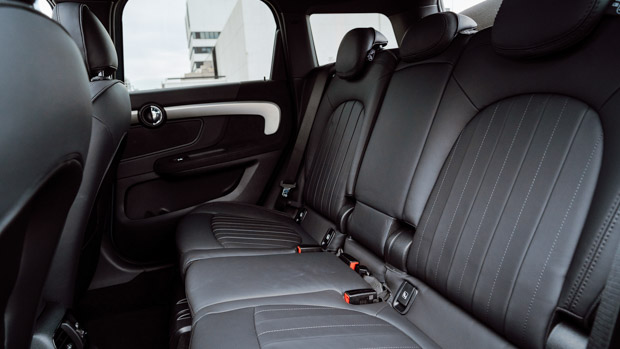
The boot is another practicality win for the Countryman with 450L of cargo space bringing it right in line with rivals. That generous space is partially due to Mini’s choice of runflat tyres, as such there is no spare under the floor to get you out of trouble.
We had limited time to drive the Countryman JCW on its Australian launch, favouring twisting country roads over city streets, so our fuel consumption average is difficult to compare with its peers. Mini claims 7.6L/100km for the JCW in the combined WLTP cycle; we scored 9.6L/100km.
Mini only offers a three-year, unlimited-kilometre warranty in Australia. That’s two years off the current industry standard, with other premium brands like Mercedes-Benz moving to five years, and the likes of Kia and Mitsubishi already at seven.
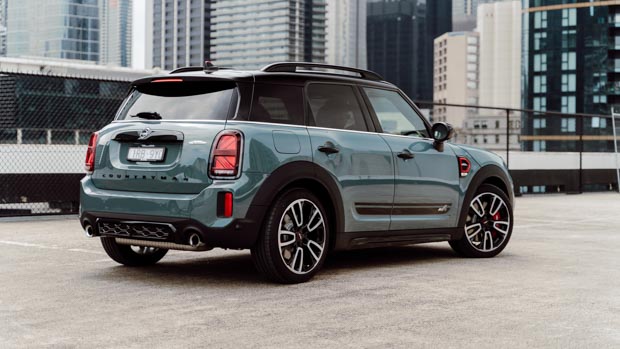
Servicing is taken care of on a condition-based model. The Countryman keeps track of brake pad wear, coolant and brake fluid age and recommends you head to the dealership accordingly, instead of at set intervals.
That said, Mini does offer service packages. The ‘basic’ package costs a reasonable $1,650 for five years/80,000km of JCW ownership.
A more expensive plus package is available for $4,320 which takes into account brake pad, rotor and wiper blade replacements over the same five year period.
Mini’s updates are minor for the JCW Countryman, but they have handily modernised the styling both inside and out, tidying up what is quite a handsome small SUV.
Despite the oily bits not changing for 2021, the Countryman JCW’s engine and chassis remain engaging enough to capture just a little bit of that Mini magic.
At $71,013 before on-roads, the JCW Signature is an expensive small SUV. This car’s biggest problem is the existence of the JCW Pure for $61,915 (plus on-roads). We haven’t driven that spec yet, but with smaller wheels, it should help the terse low-speed ride.
Priced closer to $60,000 we’d be inclined to heap more praise onto the Countryman JCW, but at this price, with its lack of safety systems and cabin tech, this particular Signature specification doesn’t offer great value.
That said, if you like driving quickly but need a practical small SUV, the Mini Countryman is worth considering alongside the usual suspects like the Audi Q3, BMW X1 and Mercedes-Benz GLA-Class. Plus, it has that infectious Mini persona.
Variant tested JOHN COOPER WORKS SIGNATURE
Key specs (as tested)
About Chasing cars
Chasing Cars reviews are 100% independent.
Because we are powered by Budget Direct Insurance, we don’t receive advertising or sales revenue from car manufacturers.
We’re truly independent – giving you Australia’s best car reviews.
The estimate provided does not take into account your personal circumstances but is intended to give a general indication of the cost of insurance, in order to obtain a complete quote, please visit www.budgetdirect.com.au. Estimate includes 15%^ online discount.
^Conditions Apply
Budget Direct Insurance arranged by Auto & General Services Pty Ltd ACN 003 617 909(AGS) AFSL 241 411, for and on behalf of the insurer, Auto & General Insurance Company Limited(ABN 42 111 586 353, AFSL 285 571).Because we don’t know your financial needs, we can’t advise you if this insurance will suit you. You should consider your needs and the Product Disclosure Statement before making a decision to buy insurance. Terms and conditions apply.
Indicative quote based on assumptions including postcode , 40 year old male with no offences, licence suspensions or claims in the last 5 years, a NCD Rating 1 and no younger drivers listed. White car, driven up to 10,000kms a year, unfinanced, with no modifications, factory options and/or non-standard accessories, private use only and garaged at night.
^Online Discounts Terms & Conditions
1. Discounts apply to the premium paid for a new Budget Direct Gold Comprehensive Car Insurance, Third Party Property Only or Third Party Property, Fire & Theft Insurance policy initiated online on or after 29 March 2017. Discounts do not apply to optional Roadside Assistance.
2. Discounts do not apply to any renewal offer of insurance.
3. Discounts only apply to the insurance portion of the premium. Discounts are applied before government charges, taxes, levies and fees, including instalment processing fees (as applicable). The full extent of discounts may therefore be impacted.
4. We reserve the right to change the offer without notice.